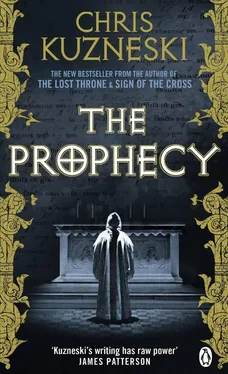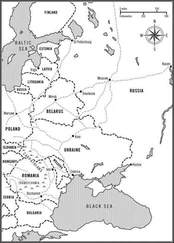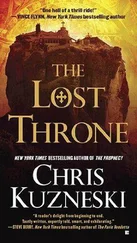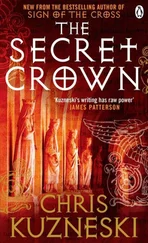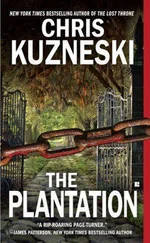Chris Kuzneski - The Prophecy
Здесь есть возможность читать онлайн «Chris Kuzneski - The Prophecy» весь текст электронной книги совершенно бесплатно (целиком полную версию без сокращений). В некоторых случаях можно слушать аудио, скачать через торрент в формате fb2 и присутствует краткое содержание. Жанр: Фантастика и фэнтези, на английском языке. Описание произведения, (предисловие) а так же отзывы посетителей доступны на портале библиотеки ЛибКат.
- Название:The Prophecy
- Автор:
- Жанр:
- Год:неизвестен
- ISBN:нет данных
- Рейтинг книги:4 / 5. Голосов: 1
-
Избранное:Добавить в избранное
- Отзывы:
-
Ваша оценка:
- 80
- 1
- 2
- 3
- 4
- 5
The Prophecy: краткое содержание, описание и аннотация
Предлагаем к чтению аннотацию, описание, краткое содержание или предисловие (зависит от того, что написал сам автор книги «The Prophecy»). Если вы не нашли необходимую информацию о книге — напишите в комментариях, мы постараемся отыскать её.
The Prophecy — читать онлайн бесплатно полную книгу (весь текст) целиком
Ниже представлен текст книги, разбитый по страницам. Система сохранения места последней прочитанной страницы, позволяет с удобством читать онлайн бесплатно книгу «The Prophecy», без необходимости каждый раз заново искать на чём Вы остановились. Поставьте закладку, и сможете в любой момент перейти на страницу, на которой закончили чтение.
Интервал:
Закладка:
‘Provençal is a dialect named after the Provence region in southern France. Today it is spoken by fewer than a half-million people, mostly in France, Spain, Italy, and Monaco. Strangely, it is also used by a few wine communities in and around Napa, California.’
Jones grunted with surprise. ‘Really? I’ll have to remember that.’
‘Centuries ago, Provençal served an important role in French culture, because it was the language used by troubadours.’
‘Is Provençal different to Middle French?’ Payne wondered.
‘Linguistically speaking, they are both Gallo-Romance languages that were shaped in France, but there are some major differences between the two. Let’s start with a timeline.’
Without warning, Ulster swivelled in his chair. AD, 1500 AD, and 2000 AD. Next he grabbed a red marker and drew a horizontal bar that ran parallel to the timeline for its entire length. Drawn two feet above the timeline, the red bar started just before 1000 AD and extended slightly past 2000 AD. He labelled it Provençal.
‘Can you read my writing?’ Ulster asked.
Payne stared at the screen. ‘Yes.’
‘Good,’ he replied as he grabbed a green marker. ‘Then I shall continue.’
A foot below the red bar and a foot above the timeline, Ulster drew a green bar. It started eight inches to the left of 1500 AD and stopped four inches past it. He labelled the bar Middle French. When he was done, the long red bar was on top, the short green bar was in the middle, and the black timeline was on the bottom.
Turning his head towards the camera, Ulster said, ‘The red bar represents Provençal. The green bar is Middle French. Jonathon, what can you tell me about them?’
Ulster nodded. ‘Records show that it has been spoken for more than a thousand years. Furthermore, as I mentioned earlier, it is still spoken today in some parts of the world.’
‘I’m guessing that isn’t the case with Middle French.’
Ulster pointed at the green bar. ‘Middle French evolved from langue d’oïl , also known as Old French, somewhere in the middle of the fourteenth century. Many grammatical changes occurred at that time — technical things that I won’t bore you with. However, it is important to understand that these changes can be traced to this particular era. In fact, it is crucial.’
Jones grimaced. ‘I don’t get it. Why is that crucial?’
Ulster smiled into the camera. ‘Because it gives us a starting point.’
‘A starting point?’
‘Tell me, David, what do you know about the letter’s origin?’
He shrugged. ‘Not a whole lot.’
‘Do you have the original in your possession?’
‘What about the name of the author?’
‘Nope.’
‘How about the date it was written?’
‘No idea.’
Ulster smiled wider. ‘Are you sure about that?’ Jones furrowed his brow and studied his copy of the letter, carefully searching for a date. Meanwhile, Payne sat next to him, doing the same thing.
‘Gentlemen,’ Ulster said, ‘the answer isn’t in your hands. It’s on the board behind me.’
The duo glanced at each other, confused, then focused on the monitor. Each of them trying to figure out the answer before the other. Several seconds passed before one of them caught on.
Jones asked, ‘You’re not talking about a specific date, are you?’
‘No, not a specific date. More like a window of time.’
‘Then I got it. Middle French started in 1350 AD, give or take an inch. The person who composed this letter used words from Middle French. Therefore, we know that this letter was written after 1350 AD.’
Ulster clapped his hands towards the camera. ‘Bravo, David! Bravo! Thanks to the inclusion of
Payne nodded in understanding, not the least bit surprised that Ulster had taken so long to make such a minor point. He had been around Ulster long enough to realize that his rambling was actually a part of his teaching process. Instead of giving a two-minute briefing where he summarized the key facts, he preferred to work in layers, slowly providing background information until an academic foundation had been established. Once he was confident that everyone had working knowledge of a topic, he would discuss the major points.
But in a situation like this, where time was critical, Payne knew he would have to stay on top of things or Ulster’s digressions would go on all day.
‘Don’t get me wrong,’ Payne said, ‘I’m thrilled that you narrowed things down, but six hundred and fifty years is a large chunk of time. Did you learn anything else from the letter?’
Ulster grinned in triumph. ‘Fear not, my boy. I’m just getting started.’
25
Finally, Payne and Jones could see what had been written.
Word Order???
‘Gentlemen,’ Ulster explained, ‘I was able to translate the individual words in your letter in a short period of time. Unfortunately, I struggled tremendously with the word order.’
‘Why is that?’ Jones asked.
‘As you’re probably aware, every language has grammatical tendencies that define its basic sentence structure. In English, nouns usually fall before verbs, adjectives typically fall before nouns, and so on. For example, the red ball bounces. Obviously there are many exceptions to these rules, but over time most people recognize the
Payne nodded. ‘We’re with you so far.’
‘Occasionally, these patterns are distorted by topography and distance. In America, for instance, people who live in the north talk differently to people from the south.’
‘You mean, accents?’
‘Although accents are quite noticeable, they are merely tonal. I was actually referring to regional dialects. Simply put, the location of your home influences the words you use and the way you structure sentences.’
Jones smiled. ‘Down south, they say y’all. In Pittsburgh, they say yinz .’
‘Yinz,’ Ulster repeated. ‘I’ve never heard such a word. How bizarre!’
‘For the record,’ Payne said defensively, ‘I grew up here, but I don’t say yinz.’
‘And since you are highly educated,’ Ulster explained, ‘I wouldn’t expect you to. Typically, the more education a person receives, the less likely they are to use regional dialects. Unless, of course, a colloquial term has been absorbed by all levels of society.’
‘Can you give me an example?’ Jones asked.
Ulster nodded. ‘Of course I can. In fact, I’ll
‘In Pittsburgh, we’d call it pop.’
‘In other parts of America, it would be called cola, a soft drink, or simply Coke. Now tell me, if you heard any of those being ordered, would you look down upon the person?’
Jones shook his head no.
‘That’s because those terms have been accepted by all levels of society. On the other hand, if someone ordered soda water or soda pop, what would you think?’
‘I’d think they grew up on a farm. Or live in the 1950s.’
‘That’s because those expressions have been phased out of high society.’
‘Very interesting,’ Jones said. ‘I never thought of that.’
Payne cleared his throat in frustration. He knew if he didn’t interrupt them soon, they would talk about regional dialects all day. And considering the recent shootings, he realized they didn’t have time to waste. ‘Sorry to cut in, Petr, but what’s your point?’
Ulster smiled sheepishly. ‘Ah, yes, my point. When I translated your letter, I didn’t detect any
‘Go on,’ Payne urged, trying to stop Ulster’s rambling.
‘As I mentioned earlier, all languages have a wide variety of nuances that make them unique. And because of this, I ran into all sorts of problems with your letter.’
‘Such as?’
Читать дальшеИнтервал:
Закладка:
Похожие книги на «The Prophecy»
Представляем Вашему вниманию похожие книги на «The Prophecy» списком для выбора. Мы отобрали схожую по названию и смыслу литературу в надежде предоставить читателям больше вариантов отыскать новые, интересные, ещё непрочитанные произведения.
Обсуждение, отзывы о книге «The Prophecy» и просто собственные мнения читателей. Оставьте ваши комментарии, напишите, что Вы думаете о произведении, его смысле или главных героях. Укажите что конкретно понравилось, а что нет, и почему Вы так считаете.
